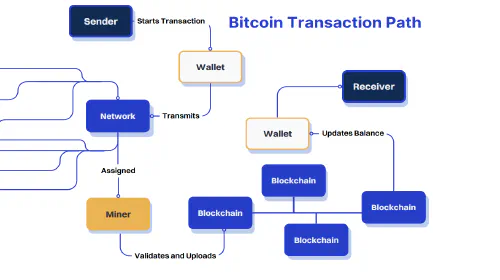Most Reliable Bitcoin Wallets: Securely Store Your Crypto Assets
Salomon Kisters
Dec 23, 2022This post may contain affiliate links. If you use these links to buy something we may earn a commission. Thanks!
As Bitcoin increasingly grows in popularity and more people see it as a potential investment option, the need for a reliable Bitcoin wallet is felt more than ever before. Bitcoin wallets are software or hardware devices that allow you to send, receive, and store Bitcoin tokens.
This article will introduce you to some of the best and most reliable Bitcoin wallets found in the market today.
What is a Bitcoin Wallet?
Did you know that Bitcoin and cryptocurrency stored on an exchange are unsafe?
Yes, that’s right! If a hacker breaches the exchange’s system, the user’s crypto holdings are compromised. Moreover, you don’t own these crypto tokens in a literal sense, as you don’t own their private keys.
And as the popular saying in the crypto space goes: “not your keys, not your crypto.”
Bitcoin wallet is a software application or a hardware device that allows you to store your Bitcoin along with private keys. And storing your crypto coins in a wallet is much more secure than keeping them on an exchange.
The following are different types of Bitcoin Wallets.
Software Wallets
Software wallets, or hot wallets, are software applications designed for your smartphones, computers, and web interface. These are the most popular type of Bitcoin wallets today among new users, as they are quite accessible and easy to use. Many software wallets are available for free to download.
Software Bitcoin wallets are perfect if you intend to make a lot of transactions on a frequent routine. They provide an easy interface with a straightforward and quick transfer procedure. On top of that, several software wallets offer a gateway to decentralized applications (DApps). However, software wallets are not completely secure. Being connected to the internet at all times puts them at risk of being hacked and stolen.
Hardware Wallets
Hardware wallets, or cold wallets, are physical devices that allow you to store your cryptocurrency assets and their security keys. These wallets operate like a USB drive for the most part. You can access them by connecting to a computer or cellphone.
However, some companies offer a screen and simplistic interface that gives you the required functionality without connecting them to a computer.
Cold wallets are generally considered the most secure Bitcoin wallets today, as they are constantly not connected to the internet. This makes it impossible for hackers to breach the device and steal your holdings. However, if you lose or break the device, chances are you lose your crypto assets too.
Despite the maximum security provided, hardware wallets are not suited for users who often transfer and trade their Bitcoin tokens. The lengthy procedure makes it quite frustrating to carry out a lot of transactions.
Paper Wallets
As the name suggests, paper wallets are slips of paper with cryptographic keys to your Bitcoin and crypto holdings written on them. These wallets are impossible to hack. However, they cannot be used for trading.
Moreover, paper wallets are very easy to lose or accidentally damage. These wallets were popular when there weren’t any good hardware wallets. With time, as cold wallet technology has improved, paper wallets have become increasingly less common.
Most Reliable Bitcoin Wallets
With so many Bitcoin wallets from different companies, users can easily get confused when picking one of them to keep their tokens secure. Following is a list of the best and most reliable Bitcoin wallets found today.
Exodus
Exodus is a hot wallet, perfect for anyone new to the world of cryptocurrency and looking for their first Bitcoin wallet. The software used is available for every desktop operating system, including Windows, macOS, and Linux. When it comes to cellphone users, the wallet has dedicated applications for Android and iOS both.
One of the highlighting features of the Exodus wallet is its compatibility with a wide range of cryptocurrencies.
Apart from Bitcoin, it supports over 200 different crypto tokens. It includes some of the most popular altcoins, such as ETH, ALGO, ADA, SOL, VET, and ONT. This gives new users the opportunity to diversify their crypto portfolio. The wallet also allows users to swap between different cryptocurrencies through an integrated DEX.
The Exodus wallet is secured by a 12-word passphrase. The straightforward interface makes it easy to navigate through the wallet. On top of that, Exodus also provides a significant amount of educational material for beginners. For added security, Exodus is integrated with some of the most popular hardware wallets out there, like Trezor Model One and Model T (discussed later on).
Ledger Nano X
Nano X is a second-generation hardware wallet offered by a French company named Ledger. Ledger has been amongst the most famous companies in the Bitcoin wallet industry ever since they launched Ledger Nano S, which was the most widely used hardware at one point. Nano X is one of their top-end cold wallets with several useful features.
For starters, Ledger Nano X supports over 1,800 different cryptocurrency assets. This provides a plethora of options for anyone who wants to invest in any virtual currency along with Bitcoin. On top of that, this list grows every year as the company keeps on adding tokens popular among users.
The wallet is built much like a regular USB drive. You can connect it through a cable to your computer or cellphone device as well as via Bluetooth. The company offers both USB-C and USB-A connectivity for better compatibility. However, the Bluetooth feature raises some concerns as it puts the device at risk of getting hacked.
Trezor Model T
Model T is a direct competitor of Ledger’s Nano X. This hardware wallet is a second-generation product by Bitcoin wallet giant, Trezor. The company has been in the business since 2011, making it one of the most experienced players in the game.
Though most of its features are the same as that of Ledger’s Nano X, one thing that sets Model T apart is its open-sourced software. Being open-sourced is generally considered a good thing, as the software is available publicly, and anyone can investigate for potential flaws or security risks.
The Trezor Model T supports over 1,200 cryptocurrencies and allows users to swap them using integrated exchanges, such as Changelly and CoinSwitch. However, the company has recently launched the Trezor Suite interface for the desktop. It provides a much simpler and more efficient user experience.
The wallet comes with USB-C connectivity which works for both computers and mobile phones. Moreover, the device also has a touchscreen, making it easier to navigate through the wallet.
Electrum
Electrum is another great Bitcoin wallet you can consider. This wallet has been around for over a decade now. It was released two years after Bitcoin was launched. And as far as changes go, it has been more or less the same since then. However, its outdated and simplistic interface doesn’t take away anything from its exceptional performance at what it was made more. In fact, being a little more complex than most new Bitcoin wallets, Electrum is a suitable option for advanced users.
The Electrum wallet is clearly made with two key features in mind: security and functionality. The wallet uses open-source software. It lets you pick the security level according to your preference. You can either go for simple two-factor authentication or a multi-signature sign-in procedure. Users also have the option to make the seed phrase more difficult to guess by adding custom words.
Another great thing about this hot wallet is that it allows you to customize transfer fees depending on how long they are willing to wait for transactions to complete. This, again, gives users more control over their assets and how they wish to spend them.
Trust Wallet
Launched in 2017, Trust Wallet is a cell phone software wallet originally created on the Ethereum blockchain. However, it was acquired by Binance in 2018 and was later relaunched on their native blockchain. Despite being quite new among its competitors, the wallet gained a lot of popularity due to its easy-to-navigate interface and widespread compatibility.
The wallet supports over 4.5 million different crypto tokens across 40 blockchain networks. On top of that, it also offers staking for multiple popular coins, such as BNB, TRX, VET, ATOM, and more. If that’s not enough, it has built-in support for a range of NFTs.
Trust Wallet is also a great platform for Web 3.0 enthusiasts since it has a built-in browser for decentralized applications. This feature makes it easy to buy, sell, spend, stake, and swap crypto assets without even leaving the wallet app.
Conclusion
The cryptocurrency space is flooded with different types of Bitcoin wallets from different companies. However, picking one to store your Bitcoin tokens and virtual assets requires extra attention. Since you’re trusting these software/devices with your funds’ security, a reliability check is a must.
As far as the perfect Bitcoin wallet goes, the answer entirely depends on your usage. If you’re someone who makes a lot of transactions, hot wallets are a better choice. On the other hand, if you’re a HODLer, a cold wallet with tight security sounds like an option worth explorin
Stay informed with the latest insights in Crypto, Blockchain, and Cyber-Security! Subscribe to our newsletter now to receive exclusive updates, expert analyses, and current developments directly to your inbox. Don't miss the opportunity to expand your knowledge and stay up-to-date.
Love what you're reading? Subscribe for top stories in Crypto, Blockchain, and Cyber-Security. Stay informed with exclusive updates.
Please note that the Content may have been generated with the Help of AI. The editorial content of OriginStamp AG does not constitute a recommendation for investment or purchase advice. In principle, an investment can also lead to a total loss. Therefore, please seek advice before making an investment decision.

How to Create a Bitcoin Blockchain Address: A Step-by-Step Guide
Discover the process of generating a Bitcoin blockchain address through our detailed step-by-step tutorial. Get started with cryptocurrency now!

Are Crypto Wallets Insured? Everything You Need to Know
Learn about the current state of insurance options for crypto wallets, including government, exchange, and personal insurance policies, and why few companies offer crypto insurance.

Can You Send BTC To A Lightning Wallet? Learn How Here
Yes, you can send BTC to a Lightning wallet. Learn how to do it using user-friendly apps available today.
Protect your documents
Your gateway to unforgeable data. Imprint the authenticity of your information with our blockchain timestamp